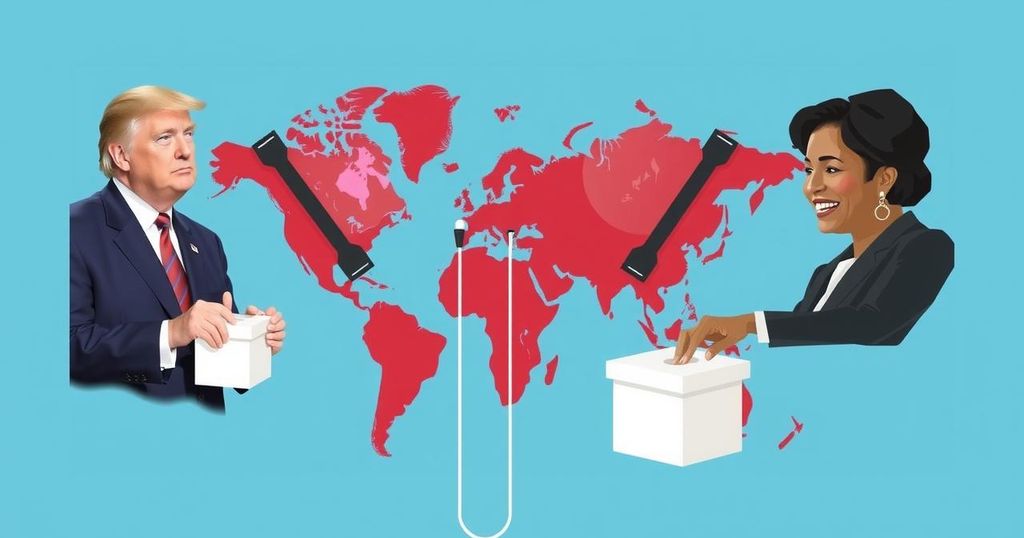World news
2024 ELECTIONS, ABC NEWS, AFRICA, ASIA, BHARATIYA JANATA PARTY, BRITAIN, DEMOCRATIC ALLIANCE, DONALD TRUMP, ELECTIONS, EUROPE, EUROPEAN UNION, FRANCE, INDONESIA, INTERNATIONAL INSTITUTE FOR DEMOCRACY AND ELECTORAL ASSISTANCE, NA, NARENDRA MODI, PARLGOV, PARLIAMENTARY SEATS, PENSION REFORM, SOUTH AFRICA, SOUTH KOREA, VOTING INTENTIONS
Lena Nguyen
0 Comments
2024 Elections Mark Significant Shift Against Incumbents Worldwide
In 2024, over 70 national elections held worldwide resulted in significant losses for incumbent parties, reflecting widespread voter discontent driven by economic factors, rising costs, and migration issues. This trend of ousting incumbents was consistent across both developed and developing democracies, with notable victories for both conservative and left-leaning parties. Analysts highlight a growing dissatisfaction with democracy itself among voters, indicating a critical shift in political sentiments globally.
The year 2024 marked a significant turning point in global politics, with over 70 national elections held across many countries, impacting more than half of the world’s population. Major democracies such as India, the United States, Indonesia, and Bangladesh participated, alongside elections for the new European Parliament involving 27 member states. An astounding more than 1.6 billion ballots were cast during these elections according to the International Institute for Democracy and Electoral Assistance (International IDEA).
The elections predominantly favored movements against incumbent parties. In developed nations, every incumbent party experienced a decline in vote share, a trend that was noted for the first time in close to 120 years as reported by the Financial Times, referencing data from the ParlGov project. Additionally, an analysis by ABC News’ 538 indicated that more than 80% of countries, regardless of their economic status, witnessed losses for incumbent parties.
Victories were claimed by conservative parties across numerous locations, with notable successes like former President Donald Trump’s sweep in the November election, the surge of the center-right Democratic Alliance in Portugal, and the far-right bloc making gains in the European Parliament. Simultaneously, left-wing parties utilized the widespread anti-incumbent sentiment to also secure victories, particularly evident in the British parliamentary election and South Korea’s parliamentary elections led by the Democratic Party.
Conversely, in some countries, while incumbents maintained power, they did so with diminished majorities. This was the case in India, where Prime Minister Narendra Modi’s party lost its outright majority, although it retained power through coalition support. Similar patterns were observed in Japan, South Africa, and France.
The trend against incumbents was less consistent in more authoritarian states, where elections could be tightly controlled to favor governments. In Rwanda, President Paul Kagame won overwhelmingly with 99% of votes, a repeat of his prior elections. Notably, there were indicators of anti-incumbent sentiments even in such regimes; for instance, Prime Minister Sheikh Hasina in Bangladesh faced a popular uprising after a tight election.
Analysts attribute these electoral shifts largely to voter dissatisfaction with prevailing global economic conditions, including inflation and migration crises, alongside unrest stemming from the pandemic’s long-term impact. The Pew Research Center found that, despite a general appreciation for democracy as a concept, dissatisfaction with its functionality and the representation of voters’ interests has surged. In a survey conducted across 24 democratic nations, around 59% expressed dissatisfaction with how democracy was functioning in their respective countries.
Looking forward, while 2025 may not see as many elections, it will be crucial to observe whether the current trend against incumbents persists and how upcoming elections in countries like Argentina, Australia, Belarus, Canada, Japan, and the Philippines will unfold.
The 2024 elections were pivotal, as they represented a global push against incumbents, significantly altering political landscapes in numerous nations. This year observed unprecedented shifts against established political parties, influenced by widespread discontent among voters regarding economic issues and perceived failures within the political system. As economic challenges and a sense of disillusionment with democracy prevailed, electoral outcomes varied across democracies and authoritarian regimes, providing an interesting study of global political trends.
In summary, the 2024 elections exemplified a notable global trend of voter discontent leading to significant losses for incumbent parties, transcending geographical and economic boundaries. The emerging dynamics illustrate a critical moment in political history, emphasizing the search for new leadership amid evolving challenges. As the world transitions to 2025, key elections will provide further insights into whether these shifts solidify or transform the political landscape once more.
Original Source: www.voanews.com




Post Comment